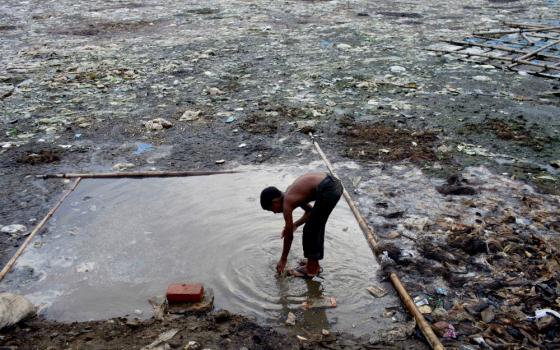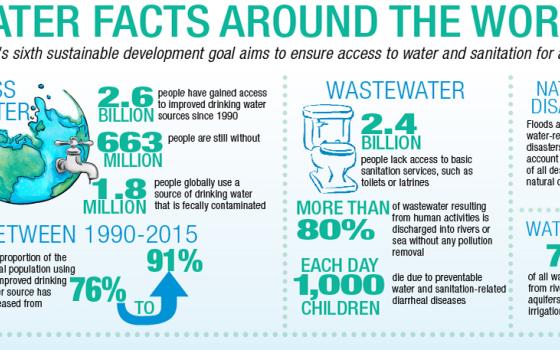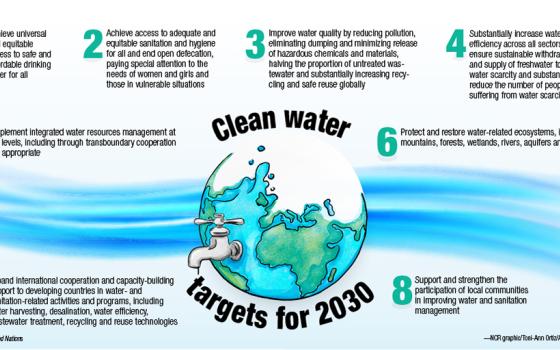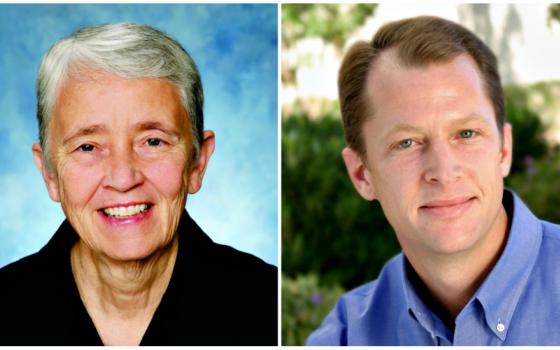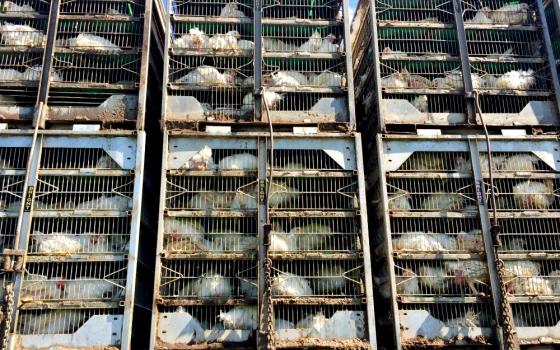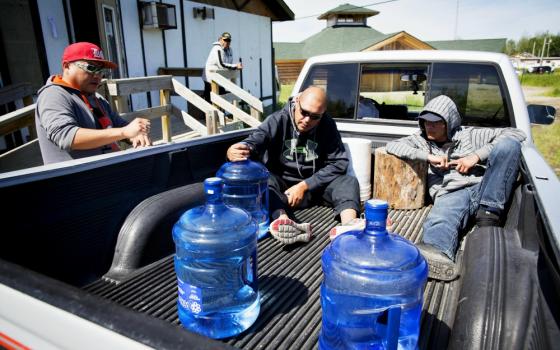Water is the entry point for those on the justice-peace journey, Sr. Maura McGrath says.
"Water is life, it's sacred, so it's got to be our way into making any moves in terms of equality and human rights," said the Congregation of Notre Dame sister from Montreal, one of many women religious around the world employing creative measures to make those moves concrete in their communities.
With clean water scarcity affecting nearly half the world's population, the United Nations' sustainable development goal on water and sanitation aims for universal access to safe drinking water, sanitation and hygiene by 2030.
Sisters work toward these goals on the ground, providing water filters to locals or organizing communities to construct piping. Others pursue sustainable development behind the scenes, focusing on responsible usage at the corporate level, such as with Campbell Soup Company and Tyson Foods. (The latter recently pleaded guilty to criminal charges for water pollution in Missouri.)
Using money to hold the powerful accountable
Wielding their power as shareholders to challenge corporations, sisters from a number of communities are teaming up to ensure the companies are water-conscious in their corporate practices.
Dominican Sr. Judy Byron is director of the Northwest Coalition for Responsible Investment. The coalition is a member of the Interfaith Center on Corporate Responsibility (ICCR), which includes more than 300 shareholders internationally and uses that leverage to work with companies on social, environmental and governance issues. Most of its members are congregations of women religious.
"At ICCR, we look at the priorities of the members and then decide, OK, the human right to water is a priority of our members, so we're going to address that with companies," Byron said. "So then the communities who have that as a priority and hold shares in the company then collaborate."
"If one person is speaking to a company, that's one thing, but sometimes on some of these issues, we get 10, 15, sometimes up to 30 members working on the issues. When you come to the company, and you have 15 shareholders who are concerned about the issue, it makes a difference."
Sisters are using the U.N.'s "Human Right to Water," which says water should be accessible, safe and affordable to all, as a standard for what they expect from companies. The congregation's representatives first request dialogues with the company, as they have been doing successfully for about seven years with Campbell Soup Company, with Maryknoll sisters taking the lead.
Campbell has recognized that water is a critical resource for both life and its business and "has been a leader" with the company's implementation of the U.N.'s goals, Byron said. Through a water stewardship policy, the company tracks and publicly reports its use of water and holds contracted farmers to the same standard by setting requirements that encourage conservative methods of watering.
"If they don't comply, then they won't be a supplier for Campbell," Byron said.
The Interfaith Center on Corporate Responsibility was the only stakeholder to ask Campbell to take a stance on the human right to water, said Dave Stangis, vice president of corporate responsibility at Campbell. Stangis, who is also the chief sustainability officer, is the liaison between the sisters and the company.
He said the fact that the sisters are shareholders of Campbell and not just an activist group makes a huge difference: They are invested in the company with a view for the long term.
"It's a refreshing conversation to talk to people who are interested, aligned, and who happen to be investors in the company," he said. "They really do want to feel good about what they and their institutions own."
"They're tough, they know their stuff, but most of our conversations are two-way," he said of working with the coalition. "They're looking to learn from us what the real challenges are, trying to really understand some of the concepts that they might only hear bits and pieces of from other companies and stakeholders. It's been a positive conversation for many years now."
But when dialogues prove not to be enough — as is the case with Tyson Foods, a poultry company based in Springdale, Arkansas — the interfaith coalition files a shareholder resolution. Shareholders must hold more than $2,000 worth of stock for at least a year before they can file a resolution voted on at the company's annual meeting.
Tyson pleaded guilty Sept. 27 in federal court to two criminal charges of violating the Clean Water Act in Springfield, Missouri. Discharges at its slaughter and processing facility led to the death of about 108,000 fish in Clear Creek in the city of Monett. Along with a $2 million fine, the company will have to implement environmental compliance programs.
Tyson declined to comment for this story.
Fifteen percent of Tyson's shareholders (representing millions of shares) have signed on to a resolution to hold suppliers more liable, an effort spearheaded by the American Baptist Home Mission Societies. The resolution will be voted on in early 2018.
A majority of those supporting the resolution are religious communities: Adrian Dominican Sisters, Daughters of Charity, Felician Sisters, Monasterio Pan de Vida (Benedictine Sisters), Sisters of Providence (Mother Joseph Province), Sisters of St. Francis of Philadelphia, and Good Shepherd Sisters.
In August, the group led by American Baptist Home Mission Societies filed a resolution for the fourth time since 2014 at the company's annual meeting. Tyson has not yet adopted a water stewardship policy that the group has put forth, but Mary Beth Gallagher, executive director of the Tri-State Coalition for Responsible Investment (also a member of the interfaith coalition), said more investors sign on to the resolution every year.
When the first resolution was brought to the annual meeting in 2015, only 10 percent of shareholders supported it; now, about 15 percent do, Gallagher said. However, Tyson Limited Partnership, which is primarily Tyson family members, owns more than 70 percent of the shares. (Without the family's votes, the resolution would have gone from 15 percent to 59 percent in support, Gallagher said.)
Despite the disparity in control over shares, Gallagher said, "investor pressure is growing to have the company take steps to manage water in a more proactive, systemic and responsible way.
"There's growing consumer interest around sustainable food and how food is grown, so there's reputational risk for Tyson to be associated with poor water management, poor community engagement," she said, noting how in September, Tyson had to suspend its plans to build a poultry plant in Tonganoxie, Kansas, after the community protested, citing pollution as one of the main concerns.
"So this is relevant to their core business and their ability to continue to grow their model," Gallagher said. "If they're not looking at sustainable business practices in a comprehensive way, then their social license to operate and community engagement will start to have serious issues."
Through the Interfaith Center on Corporate Responsibility, Sisters of Mercy also use their power as investors to hold mining companies accountable — namely Freeport-McMoRan and Newmont — as mining affects both contamination of and accessibility to water.
"Some of the mines are in water-stretched areas [such as Africa or Central Asia] where there are precious resources to start with," said Pat Zerega, director of shareholder advocacy for Mercy Investment Services.
Confronting the corporations can be a challenge, she said, as those living in the region might lack a go-to representative in the company with whom they can have a dialogue.
"When a big company comes in, a lot of the community organizing that you would tend to do is extremely hard because we deal with multinational countries that don't really have a presence [of representatives] on the ground, and there's usually a language difference.
"One of the things we can do as shareholders is make that jump," she said, noting that they help raise voices by making sure the locals have access to a company representative on the ground.
The Interfaith Center on Corporate Responsibility also plans to address leather tannery issues in Bangladesh.
Common practices in Bangladesh include companies regularly dumping wastewater rife with acids and dyes into the same rivers where people bathe and wash their clothes. In addition, workers in the tanneries don't receive proper equipment to protect themselves from the chemicals.
The Interfaith Center on Corporate Responsibility plans to engage with companies like Macy's, Coach, Sears and Kate Spade that acquire leather from Bangladesh and work with them to encourage their suppliers to improve their practices.
"Sometimes the immediate reaction is to pull out and not use them as suppliers, but that doesn't help the people in Bangladesh who need jobs," Byron said.
Attuned to the importance of water
In Canada, members of the Justice, Peace and Integrity of Creation (JPIC), a department of the Canadian Religious Conference that has local contacts in communities to facilitate social justice issues, met over the summer to contemplate the vitality, scarcity and spirituality of water.
The theme of this year's Justice, Peace and Integrity of Creation national gathering, held June 6-8 in Toronto, was Sacred Water, drawing community coordinators and women religious alike to share their missions and reflect on water's worth.
Catholics are especially attuned to the importance of water, said Apraham Niziblian, national coordinator for the Canadian Religious Conference and associate director of Justice, Peace and Integrity of Creation.
"From our mother's wombs to its use in baptism and its omnipresence in celebrations — there's a centrality to it," he said.
Those who attended the Sacred Water conference may focus on different aspects of social justice, including working on environmental causes or ministering to the poor, and "when you bring it all together," Niziblian said, "you realize water is at the heart of all of it."
Sisters who minister in developing countries, including Bolivia, Haiti or throughout Asia, "come back and realize how important water is for the development of women in general," Niziblian said. Those who don't have access to water have to give up time for work or education to find drinkable water, keeping them "in a cycle that continues to hinder their development," he said.
He added that although Canada is a developed country with 20 percent of the world's fresh water, it's not immune to these issues, either, as developing regions with the country's First Nation tribes also lack potable water.
"That's how [participants] really connected at the conference," Niziblian said.
McGrath, who also attended the Sacred Water gathering, said it served as a jump-start, encouraging congregations to network among themselves — a practice they carried out before the conference, but this time with water ministries in mind.
The conference's two speakers demonstrated different ways to call attention to the issue in their communities. One was Elder Josephine Mandamin, an Ojibwe grandmother and water walker. For 20 years, Mandamin has hosted water walks, in which she walks hundreds, sometimes thousands of miles between bodies of water, praying at each stop at a body of water and using the opportunity to educate others on the importance of water.
The second speaker was Maude Barlow, chairperson of the Council of Canadians who also led the U.N.'s recognition of water as a human right. Barlow spoke of a project called Blue Community, a joint initiative for coalitions that adopt a framework to provide water to the public, and said her dream is for every community and city to belong to it.
McGrath said the speakers reminded her "to do my best to see what we could do as the Congregation of Notre Dame, becoming part of Blue Community."
She said this was the first time she remembers religious communities coming together to discuss solely water.
McGrath recalled a quote from the Rev. Martin Luther King Jr. that Barlow invoked in her speech, that laws "may not change the heart, but they can restrain the heartless."
"That helped me in the sense of knowing that there's no way out of it," she said. "We have to try to push our lawmakers, those whom we elect," to pass "laws that protect all creation."
"There's no question that the state of water is dire at this time, so it's incumbent upon us to protect it."
[Soli Salgado is a staff writer for Global Sisters Report. Her email address is ssalgado@ncronline.org. Follow her on Twitter @soli_salgado.]
